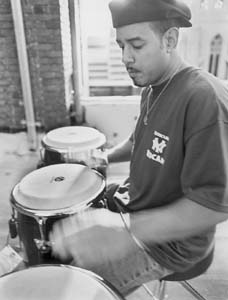
Jeff Bender
San Francisco's CuBop label brings Afro-Cuban jazz to the Left Coast
By Andrew Gilbert
CuBop is on a roll. The small San Francisco record label is releasing two high-powered Latin jazz sessions this month, and the timing couldn't be better. In the mid-'90s, CuBop's parent label, Ubiquity, helped transform acid-jazz from a nightclub phenomenon into a far-reaching musical movement. With interest in Afro-Cuban music surging from Carnegie Hall and the Village Vanguard to the Fillmore and Justice League, Ubiquity once again has the right sound at the right time.
While some might question why CuBop hasn't mined the Bay Area's talent-rich community of Afro-Cuban players, the label has developed an impressive track record finding talent where others have missed it. CuBop's two upcoming releases are Mambo 2000, by Los Angeles-based percussionist and bandleader Johnny Blas, and Mambo Rage, by British percussionist Snowboy and his band, the Latin Section. Though Snowboy is already a well-established bandleader who has toured and recorded widely in Europe, this is his first U.S. release. Blas spent years scuffling in L.A., trying to break into that city's tough Latin music scene, before hooking up with CuBop. And on the strength of his first CuBop release, 1997's Skin and Bones, Blas' hard-driving, old-school Eddie Palmieri-influenced style has found an international audience.
"I'm popular all over the world, everywhere but L.A.," says Blas, who is of Puerto Rican descent. "The thing is, in Los Angeles, we've got a bunch of musicians with original sounds. In New York and Puerto Rico, they've got bad-ass musicians, but the bands all sound the same.
"Poncho Sanchez is the only one who's doing it down here," Blas continues, referring to the Southern California-based conguero, who is a perennial favorite on the Latin jazz scene (and records for Concord, another Bay Area label). "I just don't know why we couldn't get signed up with a decent label in L.A."
As a young musician steeped in the past and striving to develop his own sound, Blas fits perfectly into the CuBop universe. His band's four-trombone horn section harks back to Palmieri's influential Conjunto Perfecta, but Blas writes all his own material (the smoking version of Tito Puente's "Picadillo" on Mambo 2000 is his first cover). His gift for crafting crackling melodic hooks and the hard-swinging arrangements by trombonist Dan Weinstein and pianist Mark Gutierrez, both longtime band members, give the octet a cohesive personality.
 Rolling on Rhythm: Johnny Blas spent years trying to break into L.A.'s Latin music scene before he hooked up with the CuBop label, where his hard- driving, old-school style has found an international audience.
Rolling on Rhythm: Johnny Blas spent years trying to break into L.A.'s Latin music scene before he hooked up with the CuBop label, where his hard- driving, old-school style has found an international audience.
Jeff Bender
"I used to listen to Tito Puente, Ray Barretto," Blas says of his career before hooking up with CuBop. "I was tired of being a sidemen with these Top-40 salsa bands, you know what I'm saying? So I started to write some rap music for other bands, and I started doing my own demos, Latin jazz, producing myself. I play flute, that's how I write all my melodies, and I started coming up with all these tunes, writing stuff fast all the time. I'd write it on toilet paper or whatever."
An even more telling CuBop success story is Bobby Matos, a veteran percussionist whom the label saved from obscurity. Overlooked for decades in Southern California, Matos managed to keep an excellent working band together. Ubiquity launched the CuBop label by reissuing a highly prized Matos LP from the late '60s, My Latin Soul, then brought him into the studio to record two new albums. His latest CuBop release is Sessions, a 14-year retrospective that captures various facets of his soul-drenched Afro-Cuban jazz.
This sense of history is part of what sets Ubiquity apart from the many labels just looking to put across the next big thing. After all, Ubiquity is a label born out of the relentless search for musical treasure buried by the shifting sands of fashion. It was created by record collectors who know all about the adrenaline-inducing hunt through used record bins.
When DJs Jody and Michael McFadin relocated to the Bay Area from Southern California a decade ago, they opened Groove Merchant on Haight in 1990. The record store quickly became a Mecca for people searching for collectable vinyl, especially old-school soul, R&B and hard bop. Mike D. expressed the sentiment of many a groove-ophile when he rapped on the Beastie Boys' tune "Professor Booty," "This one goes out to my main man at Groove Merchant/Coming through with the beats that I've been searchin.' "
With so many people trying to track down hard-to-find beats, breaks and grooves, it was a natural move to start releasing compilations featuring obscure tunes. The McFadins created Luv N' Haight, a reissue label whose releases became a mainstay on turntables across the country. As Luv N' Haight spun off Ubiquity, which became the parent label, and then added CuBop, the organization's mission evolved.
"Recently, we're more into developing artists as opposed to just doing compilations," says Andrew Jervis, former editor of On the One magazine and intermittent Ubiquity PR and A&R guy. "Back in 1993, acid-jazz had just kicked off, and there weren't that many people doing it. With Ubiquity, we were just showing, Hey! There's this band in Seattle, there's this guy in San Diego, these kids in San Francisco that have something going. We created CuBop a few years ago to reissue a classic session by Bobby Matos. But we haven't really tied ourselves in to the San Francisco scene."
Located on the alleylike Washburn Street in SOMA, Ubiquity looks more like an architectural firm than a record label, with its uncluttered, open spaces and semi-industrial wood and metal interior. Instead of scale models of strip malls, album-cover art lines the walls, while old jazz, soul, funk and salsa LPs take up most of the couch space. The decorating scheme is unified, but the musical taste is still eclectic.
"We still do the occasional compilations, like our new one, No Categories," Jervis explains. "The idea is to incorporate Latin jazz, hip-hop, drum 'n' bass, whatever, and hopefully people won't be turned off by the fact that it's not all just one kind of sound. Ubiquity means embracing everything."
In an age when even independent labels are falling under the sway of niche-marketing logic, Ubiquity doggedly pursues its own interests. "We only want to put out music that we like," Jervis asserts. "If we were sent a great polka record, we'd put it out."
Johnny Blas celebrates the release of "Mambo 2000" Aug. 28 at Justice League, 628 Divisadero; 415/440-0409. For old-school soul, R&B and hard bop, go to Groove Merchant, 687 Haight St. 415/252-5766.
[ San Francisco | MetroActive Central | Archives ]
![[MetroActive Music]](http://metroactive.com/music/gifs/music468.gif)